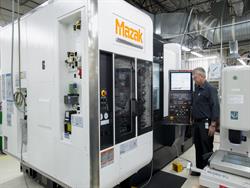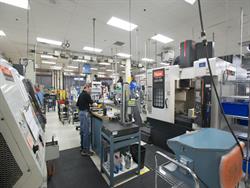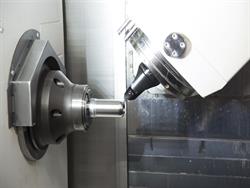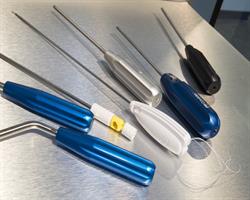CONMED Orthopedics Success Story

Constant innovation is the life force behind business success at CONMED Orthopedics in Largo, Florida. The company specializes in medical devices for orthopedic, arthroscopic and laparoscopic surgery. CONMED Largo currently manufactures about 4,300 different part catalog numbers and introduces many innovative new products per year. Competition is tough, and CONMED must continuously boost efficiency and shorten product development lead times to get its innovations to market as quickly as possible.
In the past, the company organized its shop floor into dedicated production departments based on single machining operations – milling, turning, grinding etc. But such part processing was slow in terms of response time and involved a lot of WIP, as well as significant amounts of required inventory. So to improve operational efficiencies and boost production responsiveness, CONMED – as part of its lean manufacturing initiative – added new advanced machine tool technology and transitioned to extremely flexible precision machining flow cells.
CONMED precision machining has 30 flow cells, each of which it describes as one-person autonomous machine shops. Components enter the cells as raw material and exit as completely finished parts ready for their particular surgical device assembly. Not only do the cells perform all machining operations, but also secondary processes such as deburring, cleaning, and honing and any others that are required.
Many of CONMED’s precision machining flow cells hinge on multi-tasking machines from Mazak, including the shop’s two newest cells. One of which has been designated as a “developmental machining cell.”
At the heart of CONMED’s developmental cell, or rather its one-machine prototyping cell is a Mazak INTEGREX i-100S Multi-Tasking machine. It features twin turning spindles and a 12,000-rpm milling spindle with B-axis capability, in addition to a 72-position tool magazine. The second cell incorporates two Mazak machines – an INTEGREX 200SY Multi-Tasking machine and a VERTICAL CENTER NEXUS (VCN) 410A Vertical Machining Center – teamed up with other processing equipment.
 The INTEGREX 200SY Multi-Tasking machine also sports twin turning spindles along with a RPM mill spindle with B-axis capability and multiple position tool magazines. As a 4-axis vertical machining center, the VCN 410A, now known as the VERTICAL CENTER NEXUS (VCN) 430A from Mazak, provides CONMED fast, efficient setups and ample worktable space for various part fixturing, including rotary indexing units.
The INTEGREX 200SY Multi-Tasking machine also sports twin turning spindles along with a RPM mill spindle with B-axis capability and multiple position tool magazines. As a 4-axis vertical machining center, the VCN 410A, now known as the VERTICAL CENTER NEXUS (VCN) 430A from Mazak, provides CONMED fast, efficient setups and ample worktable space for various part fixturing, including rotary indexing units.
According to William Mazurek, Director of Continuous Improvement at CONMED, leveraging the precision machining flow cell methodology together with our rapid developmental cell we continue to maximize our customer as well as our business responsiveness. The precisions machining factory operates three shifts, five days a week, so most of its cells – the Mazaks – basically run 24/7.
 “Our goal is to achieve the highest levels of equipment utilization we can,” said Mazurek. “We focus on waste elimination, faster setups/changeovers and less operator intervention. And multi-tasking capability gained from our Mazaks helps us accomplish all these objectives. Plus, the machines are extremely accurate, provide more part processing flexibility and fit well with our production flow cell concept.”
“Our goal is to achieve the highest levels of equipment utilization we can,” said Mazurek. “We focus on waste elimination, faster setups/changeovers and less operator intervention. And multi-tasking capability gained from our Mazaks helps us accomplish all these objectives. Plus, the machines are extremely accurate, provide more part processing flexibility and fit well with our production flow cell concept.”
At CONMED, prototyping various design iterations as well as minimizing job change time adds to our responsiveness and shop floor flexibility. Job lots can vary from several per shift, while others may change over every couple of days, especially those jobs involving highly complex parts.
CONMED produces both disposable and re-usable surgical instruments. Many are medical hand tools, but the company also produces pneumatic and battery operated power hand tools, as well as the implants that are put into the body using those hand tools and other instruments.
 The company develops products for many areas of minimally invasive surgery from gynecology and general surgery to products for shoulder, knee and hip. For example, surgeons will use CONMED’s instruments to implant anchors and suture assemblies for stitching torn ACL ligaments in place for them to heal. Some surgical devices and instruments can involve as many as 60 individual components or as few as three.
The company develops products for many areas of minimally invasive surgery from gynecology and general surgery to products for shoulder, knee and hip. For example, surgeons will use CONMED’s instruments to implant anchors and suture assemblies for stitching torn ACL ligaments in place for them to heal. Some surgical devices and instruments can involve as many as 60 individual components or as few as three.
Aluminum makes up about 40 percent of the parts the shop machines, stainless steel another 40 percent and brass and titanium the remaining parts. And for its implantable anchors, CONMED makes them from materials that include a poly lactate acid material the body absorbs after a certain amount of time, PEEK plastic and special grades of titanium. All products are manufactured utilizing LeanSigma methodologies, and CONMED precision machining typically holds machined part tolerances of +/-0.0005".
Today’s surgeons depend on CONMED to keep them on the cutting edge with new, innovative instruments and systems that increase procedure speed and efficacy. All these demands, in turn, dial up the pressure on CONMED not only from an innovation standpoint but also a developmental lead time one. And this is where the developmental machining cells come into play.
 Once CONMED models a new product in CAD and proves out feasibility, that product segues to the design phase and into a developmental cell. These cells determine manufacturability and ensure a smooth transition of a new product and its components into full production. CONMED runs parts in developmental cells until the product matures, after which the product’s components will move to production flow cells to step up throughput and meet the growing market demand.
Once CONMED models a new product in CAD and proves out feasibility, that product segues to the design phase and into a developmental cell. These cells determine manufacturability and ensure a smooth transition of a new product and its components into full production. CONMED runs parts in developmental cells until the product matures, after which the product’s components will move to production flow cells to step up throughput and meet the growing market demand.
“Developmental machining cells get us to market with new products as quickly as possible, while flow cells provide speed and efficiency once those products are in full production,” explained Rob Kalo, factory Manager and Chief Engineer at CONMED. “During product development, we generate a lot of iterations to achieve optimum designs, and using our dedicated development cell we provide flexible and speed. Speed is critical, and the Mazak INTEGREX i-100S developmental cell provides that by allowing us to process very complex components on one machine and in single setups.”
Kalo pointed out that CONMED opted for a 72-tool magazine on its new INTEGREX i-100S, which, according to him, contributes significantly to shorter setup times and much faster job changeovers. At CONMED, when a machine stops, it is for the shortest amount of time as possible.
“Our goal is to keep job changeovers in our cells to a minimum,” said Kalo. “Non-cut times are just as, if not more, critical to us than part machining times. We constantly evaluate exactly how long machines sit idle because the longer they do the more our efficiency suffers.”
CONMED runs its most recent Mazak production flow cell in two-shift operations. Parts enter the cell as raw material, go from the Mazak INTEGREX 200SY Multi-Tasking machine to the 3-axis VCN 410A, then to EDM and honing machines if needed and finally to secondary operations such as tumbling surface finishing, washing and anodizing. All gauging, measuring and inspection are also done within the cell.
The cell processes a variety of parts, all of which are aluminum. On average, about nine different jobs run through the cell, and job changeovers typically can occur multiple times within the same day to every three or four days depending on the business needs.
According to Mike McCool, senior manufacturing engineer at CONMED, production flow cells let them divide part processing among multiple machines that perform the various required machining operations simultaneously. This, he pointed out, makes for faster throughput, and multi-tasking machines contribute further to that output by providing shorter overall part-machining cycle times.
Companywide, CONMED employs a total of 3,600 people, and 1,100 of those work at the Largo, Florida, facility. In the past, the company had one factory and one plant manager but now has nine of what it calls focused factories at the Largo location. Largo precision machining has 18 Mazaks currently being utilized in its cellular manufacturing arrangement.
“We really benefit from the Mazak controls,” said Kalo. “With both new and many vintages of Mazaks in our facility, the common control platform is such that our machinists can move from one machine to the next and seamlessly run each of them. Our operators are not dedicated to one piece of equipment, so the control commonality helps us very much in cross training our people.”
According to Kalo, CONMED’s machining needs differ from those of the average job shop. Part processes must be highly capable and repeatable. The company’s Mazaks, he said, are very precise and provide critically needed performance consistency.
“High efficiency and short developmental lead times will continue to drive our success,” added Mazurek. “For the future, we will work toward producing component iterations even faster and getting new products to market even quicker. We need to manufacture today what sold yesterday, and machine tool technology from Mazak gives us the speed and flexibility to do so.”
Watch the CONMED case study video.
